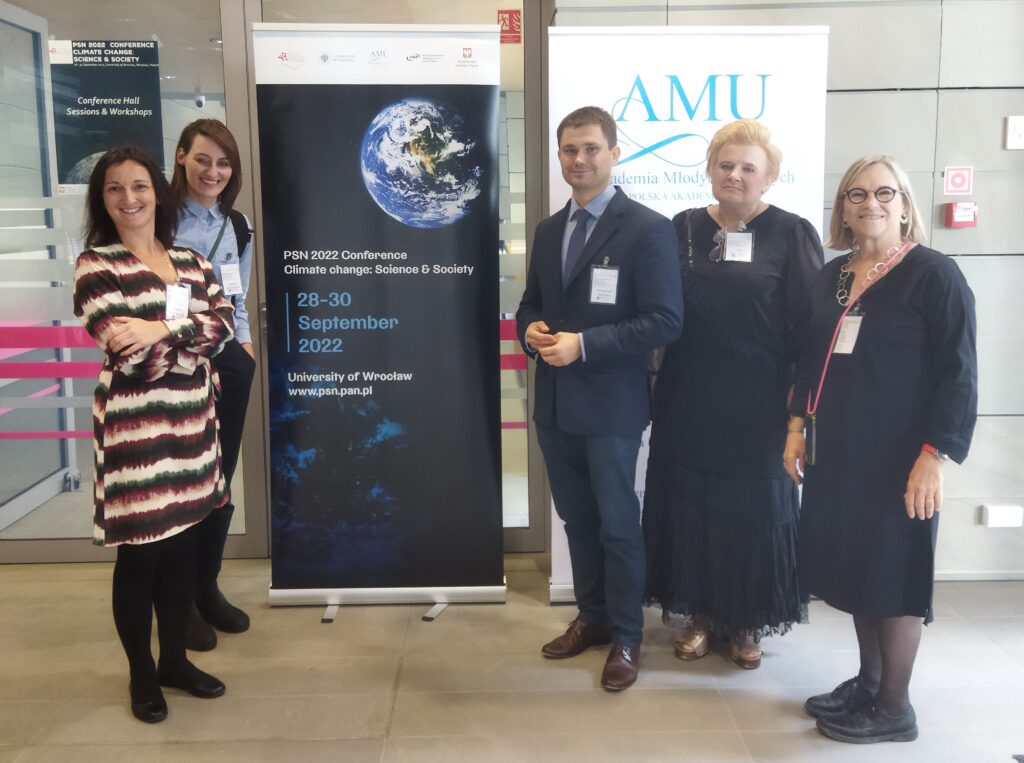Being ready to identify and engage different actors to work hand in hand on research projects is the key step to address and tackle grand challenges of the climate change. That is why, on Thursday, September 29, Polish Science Contact Agency PolSCA of the PAS in Brussels organised the information session entitled: How to involve stakeholders in the climate-related R&I projects?

The session took place during the 5th edition of the Polish Scientific Networks conference Climate “Change: Science & Society” organised in Wrocław (Poland) on 28 – 30 September 2022. This interdisciplinary conference brought together leading Polish climate change researchers and experts from around the world to better understand climate impacts on world environments and societies – and how to respond to them.
Thanks to this session the participants had an opportunity to find out how joint projects can benefit from multi-actors approach and stakeholders’ contribution. They could also discover valuable guidelines and specific methodologies, learnt from practitioners and their good practices on creating living labs and engaging local communities.
The session commenced with the brief presentation on activities of the PolSCA Office in Brussels, but its main part started with a keynote address delivered by Dr. Heather MCKHANN, leading expert on natural genetic variation in plants, who represents the French National Research Institute for Agriculture, Food and Environment; and works as Coordinator Executive Secretariat for Joint Programming Initiative on Agriculture, Food Security and Climate Change (FACCE-JPI). Firstly, dr McKhann introduced the concept of stakeholder engagement, especially through agroecology living labs. Secondly, she explained how everyone interested can be involved in co-creating future Partnership on Agroecology Living Labs and Research Infrastructures, which is now being developed under her coordination.
Afterwards, the participants had a chance to meet Polish practitioners: Prof. Lidia SAS PASZT and Ms Joanna SUCHOMSKA who were showcasing two examples of living labs and of engaging local communities in Poland.
Professor Sas Paszt is an expert in biotechnology, representing The Institute of Horticulture – National Research Institute. On a daily basic she works together with various stakeholder (companies, farmers and horticulturalists) in her research projects, such as: Bio-Fertil project, and Living Lab on Microbiome-Based Solutions for Organic Agriculture, coordinated by Prof. Magdalena Frąc from Institute of Agriculture of the PAS in Lublin. During the session Prof. Sas Paszt also presented the goals of future Centre for Innovative and Sustainable Horticultural Technologies – a laboratory complex that will be created in the Institute of Horticulture and which will be involving producers, entrepreneurs, farmers and other stakeholders working for horticulture.
The second practitioner, Ms. Joanna SUCHOMSKA works as a sociologist in the Sustainable Development Laboratory in Toruń – NGO supporting local governments in developing local policies and making decisions based on participatory processes. She shared her good practices, tips and tricks based on her work in the Sustainable Development Laboratory in Toruń as well as in Urban Living Lab in Słupsk (developed within the Creating Interfaces project, funded by JPI Urban Europe).
Those three presentations were followed by a short speech of Dr Krzysztof MĄCZKA, a sociologist from Adam Mickiewicz University in Poznań, who studies environmental sociology and public participation, including different social consultation techniques. Dr Mączka made a few observations about the Polish landscape of stakeholder participation.
The session finished with a Q&A session and vivid discussion in which the attendees shared their reflections on the added value and the impact of stakeholder participation in climate-related research.
The Polish Scientific Networks conference Climate “Change: Science & Society” in Wrocław was organised by: The Polish Young Academy, University of Wrocław, Association of the Foundation for Polish Science Scholars.


